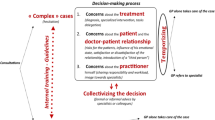Abstract
Aims
The aim of this study was to determine what made people want to change their choice of general practitioners (GP). Furthermore, the study aimed to correlate the perceived quality of patient-GP communication with the motives inducing individuals to change their doctors.
Methods
All people requesting to change their GPs were asked by the office staff to complete a questionnaire.
Results
The study identifies the following main reasons for changing GP: patients perceived the doctor as unwilling to listen to them; patients did not receive the services that they considered useful for their health; and patients perceived the doctor’s disorganization as an obstacle to accessibility.
Conclusions
These findings suggest several actions to improve the doctor–patient relationship, including training for physicians to develop their communication skills; involving public health operators in helping to understand the rights and obligations of patients and doctors; and a reorganization of the GP’s workload.
Similar content being viewed by others
References
Starfield B (2008) Refocusing the system. N Engl J Med 359(13):2087–2091
Cohen D, McDaniel RR Jr, Crabtree BF et al (2004) A practice change model for quality improvement in primary care practice. J Healthc Manag 49(3):155–168
Baker R, Lakhani M, Fraser R, Cheater F (1999) A model for clinical governance in primary care groups. BMJ 318(7186):779–783
Ashley SM, Strasser S (1997) The patient as a valuable source of outcomes and quality information. Nutrition 13(7–8):701–702
Wensing M, Jung HP, Mainz J, Olesen F, Grol R (1998) A systematic review of the literature on patient priorities for general practice care. Part 1: description of the research domain. Soc Sci Med 47(10):1573–1588 Review
Marcinowicz L, Chlabicz S, Grebowski R (2009) Patient satisfaction with healthcare provided by family doctors: primary dimensions and an attempt at typology. BMC Health Serv Res 9:63
Heje HN, Vedsted P, Sokolowski I, Olesen F (2008) Patient characteristics associated with differences in patients’ evaluation of their general practitioner. BMC Health Serv Res 8:178
Collin ks, Schoen C, Joseph S et al (1999) Health concern across a woman’s lifespan: 1998 Survey of Women’s Health. The Commonwealth Fund, New York
Bjerrum L, Sørensen AS (1992) Why do patients change physicians? Ugeskr Laeger 154(50):3587–3589
Williams S, Weinman J, Dale J, Newman S (1995) Patient expectations: what do primary care patients want from the GP and how far does meeting expectations affect patient satisfaction? Fam Pract 12(2):193–201
Kuzel AJ, Woolf SH, Gilchrist VJ et al (2004) Patient reports of preventable problems, harms in primary health care. Ann Fam Med 2(4):292–293
Gandhi IG, Parle JV, Greenfield SM, Gould S (1997) A qualitative investigation into why patients change their GPs. Fam Pract 14:49–57
Teutsch C (2003) Patient–doctor communication. Med Clin North Am 87(5):1115–1145
Cohen J (1977) Listening to patients. Aust Fam Physician 6(11):1421–1434
Stewart MA (1995) Effective physician–patient communication and health outcomes: a review. CMAJ 152(9):1423–1433
Lester GW, Smith SG (1993) Listening and talking to patients. A remedy for malpractice suits? West J Med 158(6):639
Yedidia MJ, Gillespie CC, Kachur E et al (2003) Effect of communications training on medical student performance. JAMA 290(9):1210–1212
Conflict of interest
There is no conflict of interest to disclose.
Author information
Authors and Affiliations
Corresponding author
Rights and permissions
About this article
Cite this article
Buja, A., Cavinato, M., Perissinotto, E. et al. Why do patients change their general practitioner? Suggestions on corrective actions. Ir J Med Sci 180, 149–154 (2011). https://doi.org/10.1007/s11845-010-0571-6
Received:
Accepted:
Published:
Issue Date:
DOI: https://doi.org/10.1007/s11845-010-0571-6




